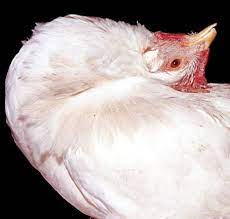The Newcastle disease is a highly communicable viral infection that affects different breeds or species of birds, including chickens. It is caused by the Newcastle disease virus also called (NDV).
This virus belongs to the avian paramyxovirus serotype 1 known as (APMV-1). The severity of the Newcastle disease can vary; from mild respiratory symptoms to severe forms that can cause high death rates in poultry farms.
Based on the strength of the virus (Virulence), the Newcastle disease virus is classified into different strains.
Different Strains of Newcastle Disease
These strains include:
Low Pathogenic (LPMV): The LMPV strains typically cause mild respiratory symptoms in poultry birds, especially chickens. The LPMV strains may go unnoticed in the farm, since infected birds may not show any obvious sign of infection.
Highly Pathogenic (HPMV): The HPMV strains cause severe nervous, respiratory and digestive symptoms, leading to high death or mortality rates in infected birds. These strains are of high concerns due to their potential for rapid spread and significant economic impact on the poultry industry.
How Is The Newcastle Disease Virus (NDV) Transmitted?
The Newcastle Disease Virus is transmitted through direct and indirect means.
Direct Transmission: the direct transmission of Newcastle disease happens when there is a direct contact between infected and non-infected birds
Indirect Transmission: The indirect transmission happens where there is no direct contact between birds but through other means like contaminated feeds, feeders and drinkers, contaminated water, farm wears and more.
Note: birds in the wild, like the waterfowl, can also act as carriers of the virus without showing any visible signs of the infection.
What Are The Signs Of Newcastle Disease Virus In Poultry?
The clinical signs of Newcastle disease in poultry birds may include:
Respiratory signs: respiratory signs like nasal discharge, sneezing, coughing and difficult breathing may present
Nervous Signs: Nervous signs trembling, paralysis, twisting of neck and head may also present.
Digestive Signs: Newcastle Disease Virus may also be presented with diarrhea and greenish poop
Feeding Disorder: Birds affected by Newcastle disease experience a feeding disorder leading to waste of food, inappetence, poor feed conversion, loss of weight.
Drop in Eggs Production: Laying birds affected by Newcastle virus may experience a very sharp drop in egg production even at their peak laying stage
Prevention And Control Of Newcastle Disease Virus
Prevention and control of Newcastle virus in poultry farms has proven to be a difficult task recently. There are many contributory factors to this.
While a majority of farmers solely depends on the use of vaccines to effect prevention of the virus, in most cases, it doesn’t work. This isn’t because the vaccines aren’t effective, they have been misused over time and the strains has modified.
Secondly, the majority of farmers do not follow the vaccination guide to ensure effectiveness of the vaccines. Every vaccine must follow the cold-chain process or system to ensure its effectiveness.
The effective prevention and control of the Newcastle Disease Virus involves the implementation of very strict biosecurity measures and proper sanitation.
While vaccination is the most common strategy employed by farmers in prevalent areas to wade off the virus, it must be done with care, following all the vaccination guides.
If you are an organic farmer, you do not need to use any vaccines. Keeping up with the organic medication chat and following up with utmost biosecurity measures guarantees you up to 95 percent safety.
The Newcastle disease virus is not only a concern because of its impact on the health of poultry birds but largely because of its economic impact on the poultry industry in general.

